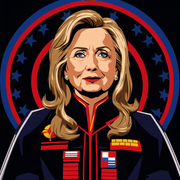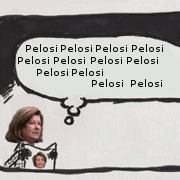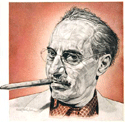- Party Plane Jones
- Jul 1, 2007
-

by Reene
-
Fun Shoe
|
Here's the whole article so you don't have to do whatever it is to get around the NYT paywall
quote:One sunny Wednesday in February, a gangly man in a sports jacket and a partly unbuttoned paisley shirt walked into the Los Angeles field office of the F.B.I. At the reception desk, he gave his name — Val Broeksmit — and began to pace anxiously in the lobby.
Mr. Broeksmit couldn’t believe he was voluntarily meeting with the F.B.I. An unemployed rock musician with a history of opioid abuse and credit card theft, not to mention a dalliance with North Korea-linked hackers, he was accustomed to shunning if not fearing law enforcement. But two investigators had flown from the bureau’s New York office specifically to speak with him, and Mr. Broeksmit had found their invitation too seductive to resist. Now the agents arrived in the lobby and escorted him upstairs.
They wanted to talk about Deutsche Bank — one of the world’s largest and most troubled financial institutions, and the bank of choice to the president of the United States. Mr. Broeksmit’s late father, Bill, had been a senior executive there, and his son possessed a cache of confidential bank documents that provided a tantalizing glimpse of its internal workings. Some of the documents were password-protected, and there was no telling what secrets they held or how explosive they could be.
Federal and state authorities were swarming around Deutsche Bank. Some of the scrutiny centered on the lender’s two-decade relationship with President Trump and his family. Other areas of focus grew out of Deutsche Bank’s long history of criminal misconduct: manipulating markets, evading taxes, bribing foreign officials, violating international sanctions, defrauding customers, laundering money for Russian billionaires.
Subscribe to With Interest
Catch up and prep for the week ahead with this newsletter of the most important business insights, delivered Sundays.
In a windowless conference room, one of the agents pressed Mr. Broeksmit, 43, to hand over his files. “You’re holding documents that only people within the inner circle of Deutsche would ever see,” he said.
“Clearly, things went on in Deutsche Bank which weren’t kosher,” added the second agent. “What we’re up against is, all those bad acts are being pushed down on the little people on the bottom.”
“The low-hanging fruit,” said the first agent.
“And the larger bank in its entirety is claiming ignorance and that it’s one bad player,” said his partner. “But we know what we’ve seen. It’s a culture of just — ”
“Fraud and dirt,” Mr. Broeksmit interjected. Already, he was warming to the idea of having a cameo in a high-stakes F.B.I. investigation. He spent the next three hours vaping, munching on raspberry-flavored fig bars and telling his story, entranced by the idea of helping the investigators go after executives high up the Deutsche Bank food chain. (Deutsche Bank has said it is cooperating with authorities in a number of investigations.)
When he finally emerged from the Los Angeles field office, Mr. Broeksmit got into a Lyft and called me. His adrenaline, I could tell, was still pumping; he was talking so fast he had to stop to catch his breath.
“I am more emotionally invested in this than anyone in the world,” he said. “I would love to be their special informer.”
The next great American whistle-blower
Here’s the thing about whistle-blowers: They tend to be flawed messengers. Daniel Ellsberg, Chelsea Manning, Edward Snowden — each of them was dismissed as selfish, damaged, reckless and crazy. Yet all of them, regardless of motivation, used secret documents to change the course of history.
For more than five years, Val Broeksmit has been dangling his Deutsche Bank files in front of journalists and government investigators, dreaming of becoming the next great American whistle-blower. He wants to expose what he sees as corporate wrongdoing, give some meaning to his father’s death — and maybe get famous along the way. Inside newsrooms and investigative bodies around the world, Mr. Broeksmit’s documents have become something of an open secret, and so are the psychological strings that come attached. I pulled them more than anyone, as part of my reporting on Deutsche Bank for The New York Times and for a book, “Dark Towers,” to be published next year. It has been the most intense source relationship of my career.
An endless procession of bank executives and friends of the Broeksmit family have warned me that Mr. Broeksmit is not to be trusted, and, well, they might have a point. His drug use has sent him reeling between manias and stupors. He has a maddening habit of leaping to outrageous conclusions and then bending facts to fit far-fetched theories. He fantasizes about seeing his story told by Hollywood, and I sometimes wonder whether he’s manipulating me to achieve that ambition. He can be impatient, erratic and abusive. A few days ago, irate that he was not named in a blurb for my book on Amazon, among other perceived slights, he sent me a string of texts claiming that he’d taken out a brokerage account in my name and traded on secret information I’d supposedly fed him. (This is not true.) A little later, he left me a voice mail message saying it was all a joke.
Why do I put up with this? Because his trove of corporate emails, financial materials, boardroom presentations and legal reports is credible — even if he is not. (In this article, every detail not directly attributed to Mr. Broeksmit has been corroborated by documents, recordings or an independent source.) Besides, there’s something uncanny about how Mr. Broeksmit’s fearlessness and addiction to drama have led him, again and again, to the center of the news. In addition to Deutsche Bank’s troubles, he has figured into North Korea’s hack of Sony Pictures, the collapse of the world’s oldest bank and the House Intelligence Committee’s ongoing investigation into Mr. Trump.
We might wish our whistle-blowers were stoic, unimpeachable do-gooders. In reality, to let you in on a journalistic secret, they’re often more like Val Broeksmit.
‘Please don’t tell anyone where you’re getting this’
On a drizzly Sunday in London in January 2014, Bill Broeksmit cinched his dog’s red leash around his neck, slung it over a door and lunged forward. He was 58.
The elder Broeksmit was widely known as the unofficial conscience of Deutsche Bank and a longtime confidant of the company’s chief executive, and his death shocked the financial world. I was a reporter in The Wall Street Journal’s London bureau, and there were rumors that Mr. Broeksmit’s suicide was connected to his work — that he regretted what he’d seen and done. My colleagues and I divvied up the unpleasant task of contacting his family, and I got Val. He was easy to track down: His band, Bikini Robot Army, had a website with his email address.
When I reached him, he was in New York for his father’s funeral, and at first he asked me to leave his family alone. “Everyone is very sad and grieving right now,” he wrote. But before long he was on the phone — angry, slurring his speech, insisting without evidence that he knew why his father had killed himself and that it had nothing to do with Deutsche Bank. Over the next several months, we kept in sporadic touch as Mr. Broeksmit bounced between rehab facilities in Florida and California, trying to beat an opioid addiction and teasing me with provocative messages. (He is open about his struggles with substance abuse.) He would say things like “I think I know what happened” and then never follow up; once, apropos of nothing, he sent a picture of a San Francisco building on fire.
Finally, on a Tuesday in July 2014, he emailed me a single line: “Are you still looking into deutsche?”
The evening after his father died, Mr. Broeksmit had found the passwords to his email accounts. Now, he told me that he had discovered hundreds of messages related to Deutsche Bank. Mr. Broeksmit asked if I could help him sift through and decipher them, and I suggested a list of search terms: things like “subpoena” and “DOJ,” for the Department of Justice.
He soon forwarded an item with a number of those keywords. “Don’t know what it means,” he said. I started skimming: It was a detailed letter to Deutsche Bank from a senior official at the New York arm of the Federal Reserve, who was furious with the bank for its slipshod accounting. Trying to contain my excitement, I asked if I could write about the document. I braced for a negotiation, but all Mr. Broeksmit said was, “That’s cool. Please don’t tell anyone where you’re getting this info.” (He has since released me from that promise.)
Four days later, I published an article describing the Fed’s concerns. The bank’s shares fell 3 percent. Mr. Broeksmit told me he felt empowered by having dented Deutsche’s market value by more than $1 billion.
Val Broeksmit vs. David Boies
What makes a person crave the attention of journalists? Consider where Val Broeksmit comes from.
He was born in Ukraine in 1976, and his parents, Alla and Alexander, emigrated to Chicago three years later. Their marriage collapsed; Val and his father landed in a homeless shelter; and in 1982, Cook County took custody of the boy, placing the frightened 6-year-old in a foster home.
Meanwhile, Alla met and married Bill Broeksmit, who was then an up-and-coming banker. They moved to New Jersey and eventually extracted Val, then 9, from the foster care system. Bill adopted him — an angry, impulsive child with a strong anti-authority streak. A caseworker who visited the family noted that he insisted on calling his parents by their first names.
Val’s friends told me that he acted out through his boarding school and college years, compensating for what he described as his parents’ icy detachment. He was the guy trying to keep the party going with a little coke at 3 a.m., cajoling girls to make out with each other, stealing expensive gear from his college’s music department. (Mr. Broeksmit acknowledges all of this.) He wanted to be the center of attention, to prove that he mattered. That’s part of the reason he became a rocker — “It’s less lonely with an audience,” he once told me — but Bikini Robot Army never hit it big. When his father died and Mr. Broeksmit came into possession of his documents, he finally had an opportunity to make the world pay attention.
After his initial leak to me in the summer of 2014, Mr. Broeksmit started seeking out other big stories. Late that year, a group of North Korea-linked hackers, calling themselves the Guardians of Peace, penetrated the computer systems of Sony Pictures. When the hack became public, Mr. Broeksmit followed a bread crumb trail of links until he eventually came across an email address for the hackers.
“I’m interesting in joining your GOP, but I’m afraid my computer skills are sophomoric at best,” Mr. Broeksmit emailed the Guardians of Peace. (Typo his.) “If I can help in any other facility please let me know.” He doubted the hackers would reply, but an email soon arrived with a primer on how to access Sony’s stolen materials. As he waited for the hundreds of gigabytes to download, he sent another email. “Hey, you guys ever thought about going after Deutsche Bank?” he wrote. “Tons of evidence on their servers of worldwide fraud.” The hackers didn’t respond.
Mr. Broeksmit, leaning into his new persona as an exposer of corporate secrets, took to Twitter to post embarrassing Sony files: deliberations over who might direct a remake of “Cleopatra”; Brad Pitt freaking out about the edit of “Fury.” He wasn’t the only one airing Sony’s laundry, but his prolific postings set him apart.
David Boies — Sony’s attorney and arguably the most famous lawyer in America — sent Twitter a letter demanding that it shut down Mr. Broeksmit’s account. Another letter, from a Sony executive, warned Mr. Broeksmit that Sony would “hold you responsible for any damage or loss” stemming from the materials he had published. A few days before Christmas, a colleague and I published an article about the huge corporation and its powerful lawyer threatening this random musician.
For the first time, Mr. Broeksmit was in the public spotlight. Soon he was on the Fox Business channel. “It seems like somebody’s trying to make you the fall guy, doesn’t it, Mr. Broeksmit?” an anchor asked. The lesson was clear: The media had ravenous appetites for documents that exposed the guts of giant corporations. It even seemed virtuous to share juicy material. And Mr. Broeksmit had plenty of that.
‘I am eternally sorry and condemned’
Spelunking through his Deutsche files, Mr. Broeksmit encountered detailed information about what was going on deep inside the bank. There were minutes of board meetings. Financial plans. Indecipherable spreadsheets. Password-protected presentations. And evidence of his father’s misery.
Here was the elder Broeksmit scolding his colleagues for not taking the Fed’s annual “stress tests” seriously. Here he was, in the months before his suicide, pushing executives to deal with the American division’s alarming staff shortages. Here he was talking to a criminal defense lawyer.
Mr. Broeksmit concluded that all this might help explain why his father had hanged himself. He told his therapist, an addiction specialist named Larry Meltzer, that he was on a quest to understand the suicide. Mr. Meltzer told me that he encouraged the inquiry. He also persuaded Alla Broeksmit to increase her son’s monthly stipend from $300 to $2,500.
Figuring that more information about his father’s death might be lodged in Alla’s email accounts, Mr. Broeksmit consulted some online tutorials and broke into her Gmail. Inside, he found an extraordinary demonstration of corporations’ power to control what the public knows.
In his mother’s inbox was a scan of the elder Broeksmit’s suicide note to Anshu Jain, at the time the co-chief executive of Deutsche Bank. It was four sentences, handwritten in black ink on white printer paper.
Anshu,
You were so good to me and I have repaid you with carelessness. I betrayed your trust and hid my horrible nature from you. I can’t even begin to fathom the damage I have done.
I am eternally sorry and condemned.
Bill
Mr. Broeksmit could feel his father’s anguish. It left him in tears — and baffled. Why had his father been sorry? When had he ever been careless? How had he damaged the bank?
Mr. Broeksmit read on. He learned that his father had once looked into the conduct of some Deutsche Bank traders and concluded — mistakenly — that nothing was amiss. It turned out the traders were manipulating a benchmark known as Libor. The elder Broeksmit feared he could become a target of government investigators because he had failed to detect the fraud; spiraling, he consulted his physician and a psychologist.
Those doctors wrote to the coroner investigating Mr. Broeksmit’s suicide. One described the banker as having been “extremely anxious” over the Libor affair. The other added: “He was catastrophising, imagining worst case outcomes including prosecution, loss of his wealth and reputation.”
The coroner, Fiona Wilcox, scheduled a public hearing to discuss her findings. She intended to read aloud from the doctors’ letters. But on the morning of the inquest, at the courthouse, lawyers that Deutsche Bank had hired for the Broeksmit family took her aside and urged her not to do so in order to protect the family’s privacy.
Ms. Wilcox, who declined to comment, acquiesced. Nearly everything about Mr. Broeksmit’s specific anxieties was expunged. Where the psychologist had written that his patient imagined prosecution, the words were crossed out and replaced with “He imagined various issues.” The physician had originally described Mr. Broeksmit’s worry “about going to prison or going bankrupt even though he knew he was innocent. He kept on thinking back over all the thousands of emails he had sent over the years. He knew how lawyers can twist things round.” It was replaced with: “He told me he had been extremely anxious.” All of this — the originals, and the whitewashed version — had been emailed to Alla Broeksmit. Now they were in her son’s hands.
Dinner with Moby
Mr. Broeksmit’s antics escalated. He fished his mother’s American Express details out of her email and bought laptops, a plane ticket to Paris, rooms in luxury hotels. He told friends he was investigating his father’s death, but I wondered if he just wanted to tell people (and himself) that he was on a noble mission. At one point, Mr. Broeksmit filled out a form on the Justice Department’s website: “I’m writing in hopes of speaking to someone at the DOJ in reference to the evidence I have showing major fraud at one of the world’s largest banks.” He got a note that his message had been passed to the F.B.I.’s New York field office, but no other acknowledgment.
Ms. Broeksmit eventually wised up to her son’s credit card theft, and by the end of 2016, he was running low on cash. (In a brief phone call last year, she told me that Mr. Broeksmit “is completely ostracized from the family.”) Word spread in journalism circles that the son of a dead Deutsche Bank executive had access to revelatory materials. In Rome on New Year’s Eve of 2016, Mr. Broeksmit shared the files with a reporter for the Financial Times, periodically excusing himself to snort 80-milligram hits of OxyContin, and the journalist later connected him with someone willing to pay for the documents. On the third anniversary of his father’s death — Jan. 26, 2017 — $1,000 arrived in his PayPal account.
The money was from Glenn R. Simpson, a former journalist who ran a research company called Fusion GPS. Weeks earlier, it had rocketed to notoriety as the source of the so-called Steele Dossier — a report by a former intelligence agent containing salacious allegations against Mr. Trump. Mr. Simpson was searching for more dirt and, Mr. Broeksmit told me, he agreed to pay $10,000 for the Deutsche materials. (Mr. Simpson declined to be interviewed.)
Mr. Simpson asked Mr. Broeksmit to start searching for specific topics. “Any Russia stuff at all,” he wrote on an encrypted chat program. “Let’s get you here asap.”
They met two days later in the U.S. Virgin Islands and began combing for material on Mr. Trump, Russia and Robert Mercer, a top Trump donor. They didn’t discover bombshells — more like nuggets. One spreadsheet, for example, contained a list of all of the banks that owed money to one of Deutsche Bank’s American subsidiaries on a certain date — a list that included multiple Russian banks that would soon be under United States sanctions.
Mr. Simpson asked Mr. Broeksmit to travel with him to Washington and meet some of his contacts. Mr. Broeksmit shared some of his files with a Senate investigator and — after snorting some heroin — a former prosecutor in the Manhattan district attorney’s office. The documents found their way to a team of anti-money-laundering agents at the New York Fed. Coincidence or not, a few months later, the Fed fined Deutsche Bank $41 million for violations inside the American unit that Bill Broeksmit had overseen. (A Fed spokesman declined to comment.)
Mr. Broeksmit moved to Los Angeles to drum up Hollywood interest in his life story. Early this year, a producer invited him to a dinner party. Among the guests was Moby, the electronic music legend, who told me he was impressed by Mr. Broeksmit’s exploits and existential sadness. Moby arranged an introduction to his friend Adam Schiff, the chairman of the House Intelligence Committee, which had recently opened an investigation into Deutsche Bank’s relationship with Mr. Trump.
Mr. Schiff’s investigators badly wanted the secret Deutsche files. Mr. Broeksmit tried to extract money from them — he pushed to be hired as a consultant to the committee — but that was a nonstarter. An investigator, Daniel Goldman, appealed to his sense of patriotism and pride. “Imagine a scenario where some of the material that you have can actually provide the seed that we can then use to blow open everything that [Trump] has been hiding,” Mr. Goldman told Mr. Broeksmit in a recorded phone call. “In some respects, you — and your father vicariously through you — will go down in American history as a hero and as the person who really broke open an incredibly corrupt president and administration.” (Mr. Broeksmit wouldn’t budge; eventually, Mr. Schiff subpoenaed him.)
It was around this time that Mr. Broeksmit had his meeting at the F.B.I.’s Los Angeles field office. Someone at the bureau had finally noticed his submission to the Justice Department’s website. After the three-hour session, Mr. Broeksmit still needed some stroking, and the F.B.I. agents obliged. They told Mr. Broeksmit he could have a special advisory title. They promised to keep him in the loop as their investigation proceeded. They let him tell the world — via this article — that he was a cooperating witness in a federal criminal investigation. They even helped procure a visa for his French girlfriend.
I had to tip my hat to Mr. Broeksmit. The man whom everyone had discounted and demeaned had managed to get his information into the hands of the Federal Reserve, Congress and the F.B.I. Even if the documents ultimately prove underwhelming to these powerful investigators, Mr. Broeksmit had accomplished one of his life’s goals: He mattered.
|

























































